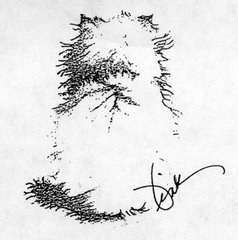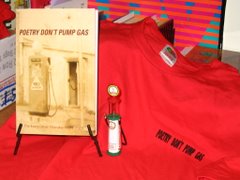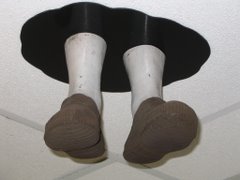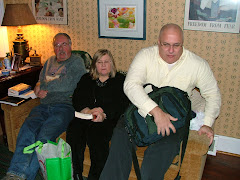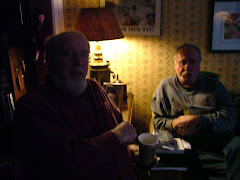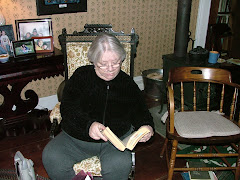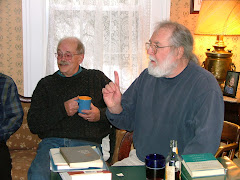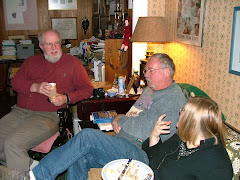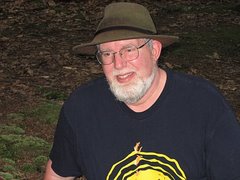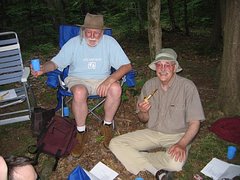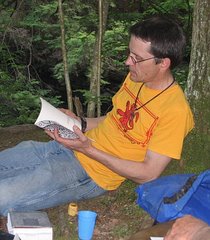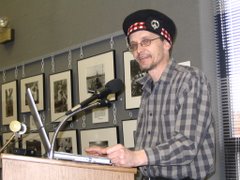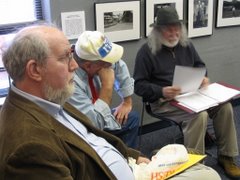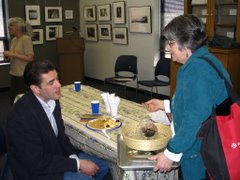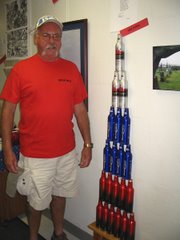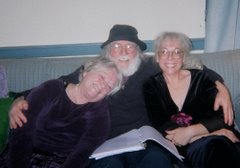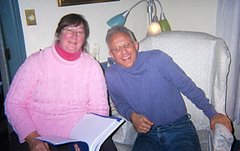Let’s face it; some nights just don’t have it. The discussion is insipid, laced with uninspired observations, statements of the obvious, boring conversations filled with irrelevancies. This wasn’t one of those nights. Opinions and observations rolled around the table like loose cannons on deck, and the nimble of foot and word had no time or inclination to yawn.
Dennis got things off to a fast and interesting start with “A Visit From the Dead,” a two and a half page piece that held everyone’s attention and sparked a good deal of discussion. Tim and Philomena both felt the poem should be read more slowly than it was to give the reader time to assimilate what it has to say. While Philomena said she sees Dennis’ poems as mystical, Tim said they seem more religious (in a general way) than mystical, and felt this poem “has tiredness and contentment in it.” My own feeling was that it is a musing on life, and projects a feeling of acceptance. Larry started chasing down a tangent about the nature of the mind vs. the nature of the soul, and a few others helped out. Larry’s statement that “Dennis has a style that grates against my inner joints” didn’t reflect my opinion, as nobody’s style has yet had any effect on my inner or outer joints. Dennis told us he felt his parents had entered the room when he wrote the poem, which would have inspired something in my mind if it happened to me. I can’t really say, though, as my parents have never showed up at any hour, but then again I’ve never been up at 3:27 AM to write anything.
Dan gave us “The Butterfly Lovers,” a work that prompted Tim to say it struck him as the type of poem that would be written by somebody who has lived a long time. I took that to mean someone who has gained much wisdom by living a long time, as opposed to some old goat who has lapsed into senility but refuses to quit writing. The poem is a brief summary of a 17th Chinese legend. Knowledge of the legend would help the reader fully understand the poem, and when Dan related the legend we found out that “The Butterfly Lovers” is a good summary of the legend, but by adding a few more lines he can make it an even better summary. Only the word “chums” didn’t quite fit.
I presented “Hospital Waiting Room” and got several good suggestions for improving it, but once again came away with the feeling that when my poem hits the table people start trying to pick off all the individual words they can, like snipers firing from a tree line. This tendency may have something to do with Tim’s statement that “Paul applies prose rules to poetry,” which is true in more instances with my writing than with the writing of most other poets around here. I’m also a big fan of punctuation, which a good number of poets avoid, even run from. However, I left convinced that a couple of words need picking off in this poem.
Jim’s “Tercet Eight: Shadow-Poet” was well received, and prompted Tim to remark: “I love this. A very human poem.” Which it is. I see this as a poem of self-analysis. Edie pointed out it that has similarities to Dennis’ poem. The “rude one” mentioned in the second verse needs more than a reference, though, and whoever he is we need to hear something defining about him, as it is certain he is not the shadow-poet. Not withstanding that the rowdy group of complexes have the math guy’s number, I personally am confident that the math guy will rout this group of ne’er-do-wells in the end.
Larry brought “Ontology,” a poem one-fourth the size of what he brought the last time. When I opined that it seemed too short to be one of Larry’s poems, the author let slip that it is part of “a much, much longer poem.” Short though it was, it still backed up Larry’s admission that “Minutiae is one of my favorite things.” (Shouldn’t that be ARE SOME of my favorite things?) Anyway, as Philomena said: “This is a fun poem.” The dark knight calculator mentioned in the second verse was the subject of some discussion involving Batman, the dark part of our own natures, and a few other things that sailed right past me. Larry surprised me when he declared ”The dark knight is making too much of a controversy, so I’m taking it out.” I’d leave it in, myself. Dennis thought the poem was “Blakean.” Look it up. I’m not opening that keg of worms.
Philomena’s “Schenpa” was based too much on Buddhism for me to understand it, and a knowledge of Buddhism is probably essential for anyone reading this piece. A sizeable footnote to shed some light on the meaning of the word “schenpa” led me to conclude this is a personal poem not meant to communicate with a large audience.
Ann presented “The Thank You Notes,” a poem about her father receiving thank-you notes from her eighth grade class for his military service during World War II that really appealed to me. It will be even better when the use of tenses is ironed out, and some confusion about exactly who is talking to whom and what is going on at the end is cleared up. Relating some additional information in the poem should do the job. This poem really had an effect on Tim, who effortlessly jumped from Tinian in World War II to Afghanistan today. By the time he finished alternately attacking the poem then praising it, I didn’t know if he was speaking from the strength of his convictions or just trying to keep the dust stirred up. This has the potential to be one of Ann’s best, in my opinion. I hope it turns out that way.
Tim’s “Washington Park 2 AM” used the dialogue of one person to paint an effective and dramatic picture of an encounter that resulted in two gay men being chased by a pack of other men intent on doing them no good. This is another of Tim’s poems that will be a hit at open mics, as it is a performance piece for sure. There is no ambiguity in this work, and few comments were made about either the form or wording. I consider it one of Tim’s best. Dennis noted, “You have the same rhythms as Gregory Corso and Allen Ginsberg.”
Last up was Edie, who offered “Gifts From My Father.” By beginning with a reference to the inheritance of unruly hair from her father, she glides into a musing on some of her father’s traits and their influence on her. Verse one and three handle this very nicely, but verse two seems to have no apparent connection to the other two. Maybe it does, but I don’t see it, and no one offered any explanation that helped me see the connection. Verse one and three stand as a poem by themselves, though. I’d like to see verse two elaborate on either her father’s characteristics or her relationship with her father instead of doing whatever it did.
ONE OTHER THING: The Second Annual Smith’s Tavern Poet Laureate Contest is coming up on April 17, and there are still places open on the competitor list. Sign up soon if you’re interested, as the sign up period will end soon no matter how many slots remain unfilled.
Write-up by Paul
Here we are...
...a group of Baby Boomers of sundry religious,
political and cultural orientations, who have been
meeting at the Voorheesville Public Library since 1991
to read and discuss each other's poems.
We include old fathers and young grandmothers,
artists and musicians, and run-of-the-mill eccentrics.
Writers are welcome to stop in and stay if they like us.
political and cultural orientations, who have been
meeting at the Voorheesville Public Library since 1991
to read and discuss each other's poems.
We include old fathers and young grandmothers,
artists and musicians, and run-of-the-mill eccentrics.
Writers are welcome to stop in and stay if they like us.
Some of Us

Dennis Sullivan, Beverly Osborne, Tom Corrado, Edie Abrams, Art Willis, Alan Casline (all seated); Paul Amidon, Mike Burke, Tim Verhaegen, Mark O'Brien, Barbara Vink, Philomena Moriarty
Wednesday, March 30, 2011
Tinian, Afghanistan, and Poets on the Run
Friday, March 11, 2011
Hiroshima, a unit of measure
Philomena knocked us out with the impact of her title (above). Edie suggested that line was a poem in itself and so strong that it overwhelmed the rest of the poem.
Edie's poem was a very sensual offering loaded with assonance and alliteration. "I spoon with you and down your spine my finger slithers..." Minor controversy arose of the use of the word fluffy which, to me and Philomena at least, stuck out like the proverbial sore thumb.
Mark impressed with "Grateful for the small acts of morning", a slow and gentle read which interestingly was interpreted by the rest of us in quite differing ways. Mine was way off base (but amusing), perhaps inspired by Edie's sex poem.
Alan was artistic - "everyday you bring out your brush and swirl the surface about" -and spare with his words - "no message message I get the message" and thought -provoking - "is there a judge in the front of this prison?" Good one.
The artistic streak carried through Tim's descriptive rather than narrative endeavor. I must admit to finding it intriguing, but hard to sort out (one woman or two? downtrodden and walking the beach or drinking on the porch?) It also included a missing lake discovered and a posing herring which turned out to be a heron. It did read like a canvas, but I remain confused. Who shoots herring anyway - or herons?
Fortunately we rely on Paul for a dependably relate-able poem and he came through again. Who hasn't flattened a penny on a railroad track? Well, maybe not Edie. The rest of us all related and I vow to do it again this summer if summer ever comes.
Welcome back, Lawlor - Dan returned from his "weathered wanderings" with a musical poem about leaving memories, loaded (by his own admittance) with cliches. Mark performed an excellent third read of the rhythmical though not rhyming Yeats-referenced work.
Okay - Larry: A long dense poem on my neo-empty period which I had the privilege to read. It was fun, a bit of a tongue twister in spots. Some lines less effective than others, could be cut for the sake of lightening it, but the poem was well-received the way it was. I love: "I nibble the piece of cake on all sides trying to keep its shape as it shrinks"
Dan W. brought to my attention the fact that I frequently mention those who are missing from meetings, as well as attendees. I guess this is fostered by my now-thwarted maternal instincts. If some of the chicks are not around, I need to know where they are. In that vein I will report that Ally Cat Anderson is in Texas, Beach Boy Burke back in Florida, Tom C. in the wilderness of Huntersland, Jim Williams and Ann Lapinski, whereabouts unknown, and Dennis sent his excuses. That reminds me that I will be absent for the next meeting on the 24th as I am planning to be sunbathing on Bradenton Beach. Someone else (and all are fighting for this opportunity) will be in charge.
Remember to sign up on March 21 for the Poet Laureate contest (Tim and Paul and I are all judges). Alan's field trip is this weekend. Call him for details. BTW, if anyone cares, we are discontinuing discussion night for lack of participation. Larry and I will be planning more exclusive trysts.
The evening included an enthusiastic exchange of info on Spanish Bar Cake between Mark and me. Anyone else remember Spanish Bar Cake?
Edie's poem was a very sensual offering loaded with assonance and alliteration. "I spoon with you and down your spine my finger slithers..." Minor controversy arose of the use of the word fluffy which, to me and Philomena at least, stuck out like the proverbial sore thumb.
Mark impressed with "Grateful for the small acts of morning", a slow and gentle read which interestingly was interpreted by the rest of us in quite differing ways. Mine was way off base (but amusing), perhaps inspired by Edie's sex poem.
Alan was artistic - "everyday you bring out your brush and swirl the surface about" -and spare with his words - "no message message I get the message" and thought -provoking - "is there a judge in the front of this prison?" Good one.
The artistic streak carried through Tim's descriptive rather than narrative endeavor. I must admit to finding it intriguing, but hard to sort out (one woman or two? downtrodden and walking the beach or drinking on the porch?) It also included a missing lake discovered and a posing herring which turned out to be a heron. It did read like a canvas, but I remain confused. Who shoots herring anyway - or herons?
Fortunately we rely on Paul for a dependably relate-able poem and he came through again. Who hasn't flattened a penny on a railroad track? Well, maybe not Edie. The rest of us all related and I vow to do it again this summer if summer ever comes.
Welcome back, Lawlor - Dan returned from his "weathered wanderings" with a musical poem about leaving memories, loaded (by his own admittance) with cliches. Mark performed an excellent third read of the rhythmical though not rhyming Yeats-referenced work.
Okay - Larry: A long dense poem on my neo-empty period which I had the privilege to read. It was fun, a bit of a tongue twister in spots. Some lines less effective than others, could be cut for the sake of lightening it, but the poem was well-received the way it was. I love: "I nibble the piece of cake on all sides trying to keep its shape as it shrinks"
Dan W. brought to my attention the fact that I frequently mention those who are missing from meetings, as well as attendees. I guess this is fostered by my now-thwarted maternal instincts. If some of the chicks are not around, I need to know where they are. In that vein I will report that Ally Cat Anderson is in Texas, Beach Boy Burke back in Florida, Tom C. in the wilderness of Huntersland, Jim Williams and Ann Lapinski, whereabouts unknown, and Dennis sent his excuses. That reminds me that I will be absent for the next meeting on the 24th as I am planning to be sunbathing on Bradenton Beach. Someone else (and all are fighting for this opportunity) will be in charge.
Remember to sign up on March 21 for the Poet Laureate contest (Tim and Paul and I are all judges). Alan's field trip is this weekend. Call him for details. BTW, if anyone cares, we are discontinuing discussion night for lack of participation. Larry and I will be planning more exclusive trysts.
The evening included an enthusiastic exchange of info on Spanish Bar Cake between Mark and me. Anyone else remember Spanish Bar Cake?
Wednesday, March 2, 2011
Smith's Tavern Contest Rules
SMITH’S TAVERN SECOND ANNUAL POET LAUREATE CONTEST
WHEN
Sunday, April 17, 2011 at NOON sharp
WHERE
Smith’s Tavern, 112 Maple Avenue, Voorheesville, NY 12186; Tel: 518-765-4163
CASH PRIZES
Poet Laureate - $100
Second Place - $50
Honorable Mention - $25
(Names to be inscribed on Laureate trophy displayed in Smith’s Tavern)
TERMS
Open to the first 25 poets who register by emailing starting noon March 21st. E-mail must be from registering poet only. Applicants will be notified of acceptance by March 28.
THREE ROUNDS
Each poet will read three poems (one per round) of 25, 35, 45 (or fewer) lines respectively, the title of the poem not being counted.
Poets will read the title of the poem followed by the body without introductory remarks, and only once.
Poets must bring five hardcopies of each poem to the contest to be handed in to Laureate Coordinator, Michael Burke, at time of registration.
The poems for all three rounds must have lines visibly and neatly numbered in the margin for easy identification, and name at top, before they will be accepted.
DAY’S SCHEDULE
Starting Time: Noon sharp (The tavern will be open at 11:15 with all poets expected by 11:30).
Reading order: Poets will be randomly assigned positions beforehand by round; sheets with the assigned positions will be distributed to poets at time of registration.
Two opening rounds—followed by a 40-minute break—then the Final Round
There will be a brief (30-second) break between readers to allow the next reader to settle in
Prizes will be awarded immediately following the scoring of the final round
JUDGING BASED ON FOUR CRITERIA (1-5 POINTS FOR EACH POEM IN EACH ROUND)
1. PRESENTATION—Poem is clear and understandable with good rhythm and flow; conveys awareness
2. MECHANICS—Uses metaphor and imagery well; exhibits concision and wholeness; has good sound
3. DEPTH OF FEELING—Is unique, creative, passionate, inspirational, fresh, and thoughtful
4. OVERALL IMPACT—Is engaging, interesting, stimulating, captivating, compelling
ALTERNATES
There will be no alternates allowed should any of the registered poets fail to show.
TIES
In the event of a tie, the judges’ scores with the lowest total score for each tied poet will be dropped. This will be done until the tie is broken. More on that the day of the event.
LAUREATE AS JUDGE
The Laureate for each year will be invited to serve as a judge for the following year’s contest but acceptance of the invitation is optional.
WHEN
Sunday, April 17, 2011 at NOON sharp
WHERE
Smith’s Tavern, 112 Maple Avenue, Voorheesville, NY 12186; Tel: 518-765-4163
CASH PRIZES
Poet Laureate - $100
Second Place - $50
Honorable Mention - $25
(Names to be inscribed on Laureate trophy displayed in Smith’s Tavern)
TERMS
Open to the first 25 poets who register by emailing
THREE ROUNDS
Each poet will read three poems (one per round) of 25, 35, 45 (or fewer) lines respectively, the title of the poem not being counted.
Poets will read the title of the poem followed by the body without introductory remarks, and only once.
Poets must bring five hardcopies of each poem to the contest to be handed in to Laureate Coordinator, Michael Burke, at time of registration.
The poems for all three rounds must have lines visibly and neatly numbered in the margin for easy identification, and name at top, before they will be accepted.
DAY’S SCHEDULE
Starting Time: Noon sharp (The tavern will be open at 11:15 with all poets expected by 11:30).
Reading order: Poets will be randomly assigned positions beforehand by round; sheets with the assigned positions will be distributed to poets at time of registration.
Two opening rounds—followed by a 40-minute break—then the Final Round
There will be a brief (30-second) break between readers to allow the next reader to settle in
Prizes will be awarded immediately following the scoring of the final round
JUDGING BASED ON FOUR CRITERIA (1-5 POINTS FOR EACH POEM IN EACH ROUND)
1. PRESENTATION—Poem is clear and understandable with good rhythm and flow; conveys awareness
2. MECHANICS—Uses metaphor and imagery well; exhibits concision and wholeness; has good sound
3. DEPTH OF FEELING—Is unique, creative, passionate, inspirational, fresh, and thoughtful
4. OVERALL IMPACT—Is engaging, interesting, stimulating, captivating, compelling
ALTERNATES
There will be no alternates allowed should any of the registered poets fail to show.
TIES
In the event of a tie, the judges’ scores with the lowest total score for each tied poet will be dropped. This will be done until the tie is broken. More on that the day of the event.
LAUREATE AS JUDGE
The Laureate for each year will be invited to serve as a judge for the following year’s contest but acceptance of the invitation is optional.
Subscribe to:
Comments (Atom)



